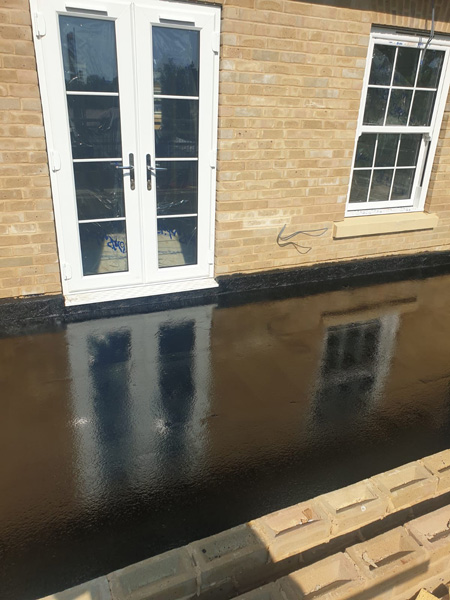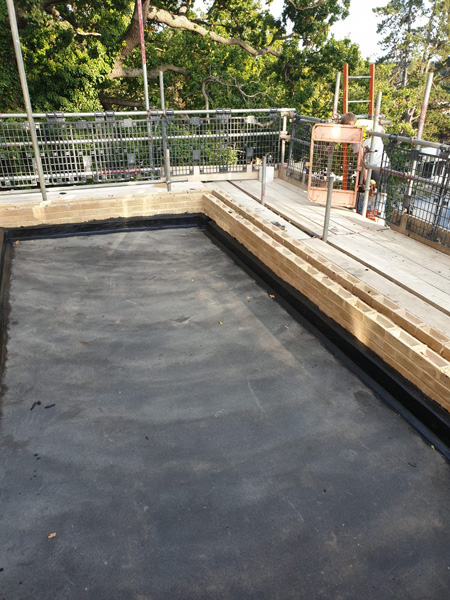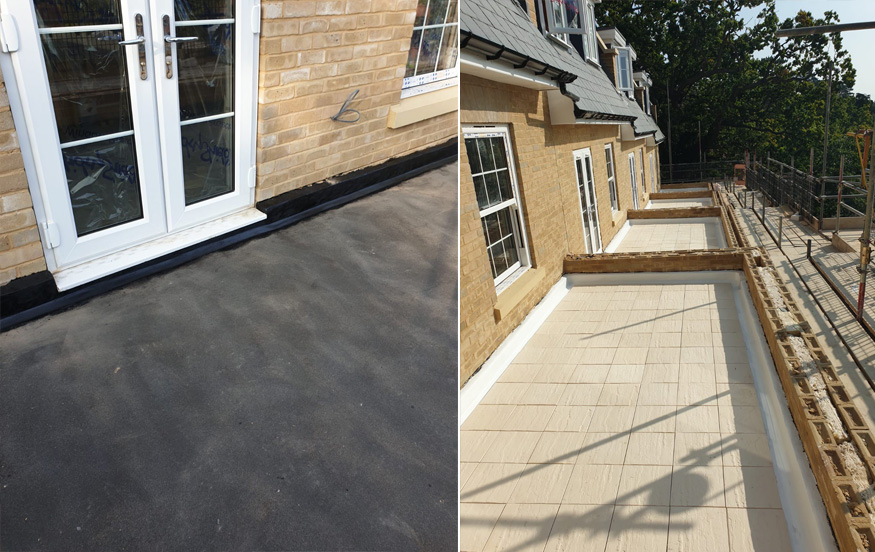Queens Drive is a collection of 32 new and converted homes located in the former grounds of Woodbridge School. Situated in the Suffolk town of Woodbridge, the homes range from one bedroom apartments to four bedroom houses. Built by Rose Homes, the specification is so high that the development was shortlisted as a finalist in the prestigious 2020 Housebuilder Awards.
Part of the development includes the conversion of the historic Queens House which was built in 1914. Within the design and layout of the properties, Rose Homes were keen to reflect traditional design and detailing.
 Some of the properties incorporate a private balcony area and an effective waterproofing system was required. Mastic asphalt was specified in conjunction with slate tiles in a sand colour for a natural look. Mastic asphalt was chosen as it is one of the toughest, most durable, time proven waterproof membranes available to architects, building developers, owners and specifiers. It offers longevity of more than 50 years and there are even examples of mastic asphalt lasting more than 100 years, such as St Paul’s Cathedral in London.
Some of the properties incorporate a private balcony area and an effective waterproofing system was required. Mastic asphalt was specified in conjunction with slate tiles in a sand colour for a natural look. Mastic asphalt was chosen as it is one of the toughest, most durable, time proven waterproof membranes available to architects, building developers, owners and specifiers. It offers longevity of more than 50 years and there are even examples of mastic asphalt lasting more than 100 years, such as St Paul’s Cathedral in London.
Mastic asphalt easily outperforms other types of waterproof membrane which is why it is extensively used on roofs, balconies, car parks, HGV service decks, bridges and other types of structural decks. Mastic asphalt was also chosen for its versatility as it provides a reliable base for many attractive waterproofing finishes including green roofs, podiums, inverted roofs with paving or timber decking, promenade tiles and reflective coatings. For this project, mastic asphalt was able to withstand the point loading with the slate tiles laid on asphalt. A white solar paint finish was applied to the detail work.
Mastic asphalt was applied by trained crafts people employed by long-standing Mastic Asphalt Council (MAC) contractor member BCC Asphalt. Mastic asphalt is one of the few construction activities still regarded as a ‘craft trade’.
The skilled work involves ensuring that asphalt is at the correct temperature, and then spreading it using traditional techniques to coat the surface. A thermoplastic material that changes shape when heated, mastic asphalt cures to form a hard, durable, finished product to suit a diverse range of applications. The mastic asphalt craft is taught by professional tutors and the traditional time-served apprenticeship is now incorporated into National Vocational Qualification Level 2.
Mastic asphalt is so durable over long periods that it is considered by construction professionals to have little or minimal impact on the environment. At the end of its useful life, mastic asphalt is 100% recyclable or can be used in materials such as mastic asphalt screeds, making it the ideal environmentally friendly option.
Mastic asphalt was the first industry in the world to achieve the CarbonZero standard. MAC’s 90+ contractors, installers and manufacturers have wherever possible reduced their carbon emissions and use of energy. The remainder has been offset with environmentally friendly energy saving schemes in the third world. It means that any project receiving the waterproofing benefits of an advanced mastic asphalt system will receive a 100% CO2 neutral solution.
 Fire safety was another consideration for this project and the high mineral content of mastic asphalt renders it virtually incombustible. Mastic asphalt fulfils all the external fire resistance required for a roof covering and achieves the highest rating (AA) when tested in accordance with BS 476: Part 3[mg1] and BroofT4 according to BS EN 13501-5.
Fire safety was another consideration for this project and the high mineral content of mastic asphalt renders it virtually incombustible. Mastic asphalt fulfils all the external fire resistance required for a roof covering and achieves the highest rating (AA) when tested in accordance with BS 476: Part 3[mg1] and BroofT4 according to BS EN 13501-5.
As mastic asphalt is laid in molten form, it is often confused with other types of waterproofing membrane that require naked flame or torch on application. In reality, there is no naked flame at the point of installation and because mastic asphalt is so highly flame resistant, there is little or no potential of fire risk.
Wayne Cooper, Director of BCC Asphalt said: “Mastic asphalt was the ideal waterproofing solution for Queen’s Drive as the client was seeking a system that has been proven over the years. We could also meet the aesthetic requirements of the project, as mastic asphalt was used in conjunction with sand coloured slate tiles which matched the colour of the build.
“The mastic asphalt system we used utilises advanced polymer technology to provide long-term durability, improved temperature stability and ease of installation. This application was carried out at the end of summer and on one of the days, the temperature reached an usually hot 33°C. but this caused no disruption to the project. Mastic asphalt can withstand rapid temperature changes which are a frequent source of breakdown in many other types of membrane.”
This article featured within the March 2021 edition of RCi Magazine – click here to view the article.

